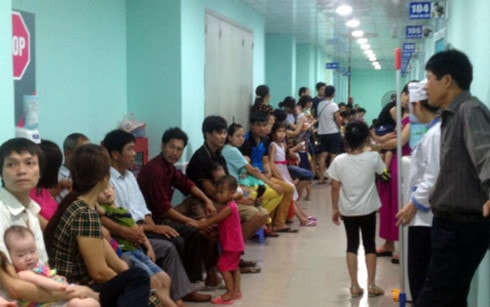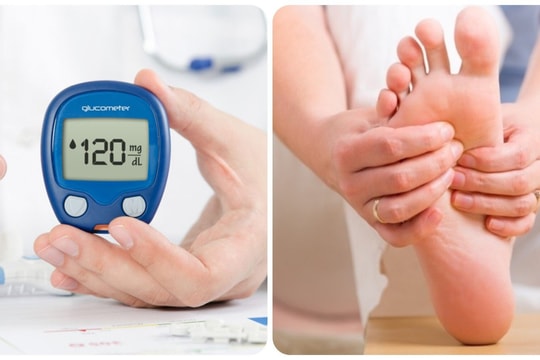Record heat, how to prevent illness for children?
Dr. Tran Thu Thuy, National Children's Hospital, warns that some common diseases in children in hot weather include: dehydration, heat cramps, heat stroke...
During hot days above 40 degrees Celsius, the National Children's Hospital has many pediatric patients coming for examination, leading to hospital overload. Associate Professor, Doctor, Doctor Le Thanh Hai, Director of the National Children's Hospital, said that every day, there are 2,500 - 3,000 patients coming for examination related to diseases such as: respiratory tract infections, diarrhea...
 |
| On hot days, Children's Hospital is always overloaded. |
To limit hospitalizations due to heat, Dr. Tran Thu Thuy, National Children's Hospital, advises: hot summer is a big concern for many parents. Abnormally high temperatures and humidity lead to the risk of children suffering from heat exhaustion, even heatstroke. Too many outdoor activities, staying in the harsh sunlight for a long time, not drinking enough water and wearing inappropriate clothing can cause children to suffer from heat-related illnesses.
Dr. Thuy said: In order to function normally, the body must constantly maintain a temperature of 37 degrees Celsius. Body temperature is tightly controlled by the hypothalamus gland located in the brain. When body temperature increases, the hypothalamus gland gives a green light, helping to initiate a series of changes in the body. Children breathe faster and shallower, blood flow to the skin increases and sweat appears.
Dr. Thuy recommends some heat-related diseases that families should pay attention to: Excessive sweating without adequate hydration can lead to dehydration and cramps, while the body does not release enough heat, leading to heat exhaustion, even heatstroke requiring emergency care. Cramps, heat exhaustion or heatstroke often appear in older children who participate in prolonged physical activities in the heat, such as playing sports. For young children, the main heat-related disease is dehydration.
1. Dehydration
A child becomes dehydrated when the amount of fluid lost through sweat and urine is greater than the amount of fluid taken in. Even small amounts of water loss, equivalent to 2% of body weight, can be harmful to a child. Dehydration reduces the body’s ability to regulate temperature and therefore increases the risk of other heat-related illnesses.
– Symptoms of dehydration:Dry lips, thirst, little or no urination, concentrated, dark urine. Crying without tears. Child is fussy, irritable. Appears lethargic, lethargic, tired. In severe cases, the child may show signs of: sunken eyes, sunken fontanel, nausea, vomiting, lethargy or coma.
– Treatment:If you suspect your baby is dehydrated, move him to a cool place and give him water to drink. If he does not feel better, seek medical help.
2. Heat cramps
– Symptoms: Heat cramps are muscle pain or stiffness, often occurring in the abdomen, arms or legs, when overexerting in hot weather. Children who sweat a lot when doing strenuous activities are prone to this type of cramps. Excessive sweating causes the body to lose water and salt, low salt content in the muscles causes painful muscle cramps. Heat cramps can also be a symptom of heat exhaustion.
– Treatment:Stop physical activity and sit still in a cool, shady place. Drink plenty of fluids. Continue to avoid strenuous physical activity for several hours after cramps stop to avoid heat exhaustion or heatstroke. Seek medical help if your condition does not improve after an hour.
3. Heat exhaustion
Warning signs:Sweating profusely, pale skin, cramps, fatigue, headache, nausea, vomiting, fainting. Cold, clammy skin. Rapid, weak pulse. Rapid, shallow breathing.
– Treatment:If left untreated, heat exhaustion can progress to heatstroke. Seek medical help if the condition does not improve after an hour. Help your child cool down by giving them cool drinks, bathing them in cool water, wiping them with cool towels, taking them to a place with a fan or air conditioner, and dressing them in light, airy clothing.
4. Sunstroke
This is the most serious heat illness. It occurs when the body is no longer able to control its temperature: body temperature rises rapidly, sweating is not enough to dissipate heat, the body cannot cool itself.
Body temperature can reach 39.5 degrees Celsius or higher within 10-15 minutes. Heatstroke can lead to death or permanent disability if not treated promptly./.
According to VOV
| RELATED NEWS |
|---|


.jpg)



.jpg)
.jpg)
